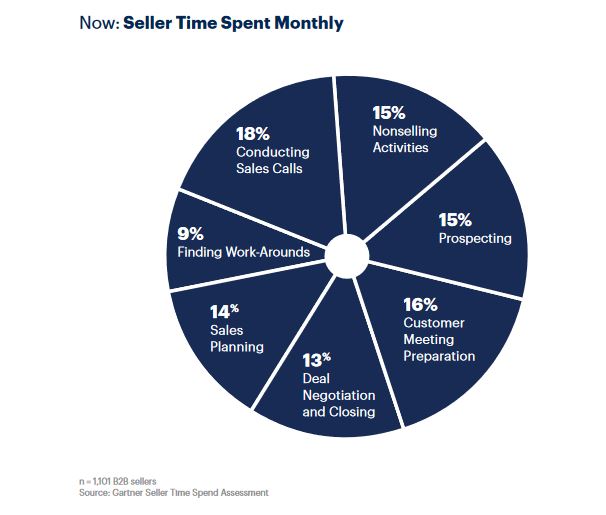Are We Using Our Time More Effectively, or Just Freeing it Up?
By: Dave Brock

Time management is a huge issue for all of us, but particularly important for sellers. A lot of the conversation focuses on “freeing up time.” But as I think about it, is the issue really about freeing up time or is it about using our time more effectively?
For example, Gartner published an interesting analysis. They looked at how sellers are spending their time.

While Gartner’s article suggests shifts in how that time is allocated—most of which I disagree with, this chart is interesting. Looking at prospecting and conducting sales calls–sellers are spending 33% of their time engaging with customers/prospects. And there are a number of other activities that are critical to enabling those meetings. For example customer meeting preparation, deal negotiation and closing are critical to getting the work done with customers.
Even non selling activities at 15% can be very important uses of time. For example, some of this time might be training–learning more about how to sell, developing business acumen, learning new tools to help us become more productive. Or it could be getting coaching and development from managers and peers.
Or sales planning at 14% of seller time. We need people to think about their territories, their customers, their opportunities, their goals. We need them to think about what they should be doing, where they should be focusing, how they can increase their impact and results.
Even the time spent in finding work-arounds. Not everything we do follows a step by step sequence and all we have to do is execute them effectively and efficiently. Stuff happens, both with our customers and within our own organizations. Great sellers have the capability of figuring things out–developing work-arounds.
Each of these areas is interrelated. Doing or not doing each of these things has a ripple through impact on each of the other areas. For example, if we don’t have the right training and skills development, our ability to conduct high impact selling and prospecting meetings, our ability to effectively manage deals through to closure will be adversely impacted. Allocating less time to some of these things can also have an adverse impact on performance in other areas., even though we may have more time to spend in those areas.
Too often, we spend a lot of time looking at how we can spend less time in one area and more time in another. In the most idealized worlds, we want people to spend 100% of their time in front of customers–conducting sales calls and prospecting. But if they aren’t doing the other things, then their ability to have high impact sales and prospecting calls plummets.
I was actually surprised by the Gartner data. It actually seemed pretty good to me. The question that arises is “for the time we spend, are we being as effective and efficient as we can be? For example 100% of our time on customer calls is meaningless if we make lousy calls. But 33% of our time conducting very high impact calls (sales/prospecting) can make us very productive.
The initial issue is less on about where we allocate our time, but more about are we using that time as impactfully as we can? 14% of our time spent in sales planning can be very powerful if we are being thoughtful about how we manage our time in the territory, figuring out what we might do to best produce our results. 16% of our time spent in preparing for meetings can help us accomplish so much more in those meetings; but we have to be doing the right things in that meeting preparation. 15% of our time in nonselling activities can improve our skills and abilities to use our time in the other areas much more effectively and efficiently.
We waste huge amounts of time! Reallocating where we spend our time doesn’t necessarily reduce the amount of time we waste, it just changes where we waste our time.
Inevitably, some of that time wasted can be eliminated that that time can be allocated differently. We waste huge amounts of time in meaningless meetings–both internally and with customers and prospects. We should simply stop those activities, reallocating that time to things that have more impact.
We have technologies that help with our efficiency and effectiveness. For example, there are a lot of tools that help us better research and prepare for calls. I don’t know that we necessarily want to reduce the amount of time we spend in doing this, but we want to improve the quality of that prep to make us more effective in our calls.
We are responsible for doing the “whole job,” not just parts of the job. If we are going to maximize our performance, we have to focus on each part of the job, doing each part as effectively and efficiently as possible. In doing this, we may find we can reallocate some time to other areas, but only after we are are doing each part of the job as effectively as possible.














